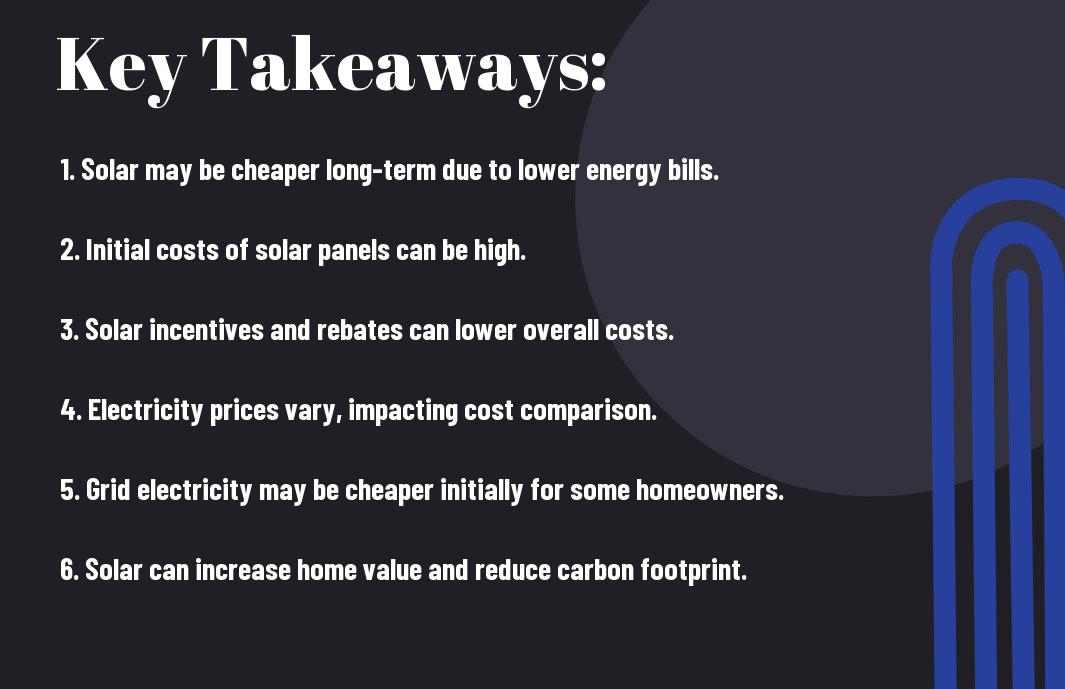You may have wondered, is using solar cheaper than traditional electricity? In this informative blog post, we will explore the cost comparison between solar energy and traditional electricity. By the end, you will have a clearer understanding of the potential savings and benefits of utilizing solar power in your home or business. Let’s dive in and shed some light on this intriguing topic!
Key Takeaways:
- Solar can be cheaper: In the long run, installing solar panels can be more cost-effective than relying solely on grid electricity.
- Upfront costs: While the initial cost of installing solar panels can be high, there are various incentives and rebates available that can help offset these expenses.
- Decreased electricity bills: Generating your own electricity through solar can lead to significant savings on monthly utility bills.
- Environmental benefits: Using solar energy reduces reliance on fossil fuels, thus helping to lower carbon emissions and contribute to a cleaner environment.
- Resilience and independence: Solar panels provide energy independence and can serve as a reliable backup during grid outages, contributing to greater resilience in times of need.

The Cost of Traditional Electricity
The rising cost of fossil fuels
Cost considerations for traditional electricity start with the rising cost of fossil fuels. Your electricity bill reflects the increasing prices of coal, natural gas, and oil, which are the primary sources of energy for generating traditional electricity. As these non-renewable resources become scarcer, their prices escalate, impacting the overall cost of electricity.
Transmission and distribution losses
Cost factors for traditional electricity also include transmission and distribution losses. These losses occur as electricity travels long distances from power plants to your home through a network of wires and transformers. The efficiency of this process varies, but typically, a significant amount of electricity is lost along the way.
Additionally, the maintenance and operation of the infrastructure required for transmitting and distributing electricity add to the overall cost. These expenses, along with the energy losses, contribute to the higher price you pay for traditional electricity.

The Cost of Solar Energy
Even Solar is now ‘cheapest electricity in history’, confirms IEA. As you consider investing in solar energy, it’s imperative to understand the various costs involved. Let’s break down the expenses associated with solar energy to help you make an informed decision.
Initial investment costs
The initial investment in solar energy can vary depending on factors like the size of the system, the quality of the components, and your location. Generally, you can expect to pay for solar panels, inverters, mounting hardware, and installation. While these costs can seem significant upfront, it’s imperative to remember that solar energy systems have long lifespans and can provide a substantial return on investment over time.
Ongoing maintenance expenses
Maintenance is another aspect to consider when evaluating the cost of solar energy. Solar panels are relatively low maintenance, requiring occasional cleaning and inspections to ensure they are operating efficiently. Additionally, you may need to replace certain components over the lifespan of the system. It’s a good idea to factor in these maintenance costs when budgeting for your solar energy system.
Energy
Government incentives and rebates
For many homeowners, government incentives and rebates can significantly reduce the overall cost of installing a solar energy system. These incentives vary by location but can include tax credits, rebates, and other financial incentives to make solar more affordable. Be sure to research what programs are available in your area to take full advantage of potential savings on your solar investment.
expenses
Overall, while there are initial and ongoing costs associated with solar energy, the long-term benefits, including energy savings and potential government incentives, make it a cost-effective and environmentally friendly option for many homeowners. By understanding the various expenses involved and exploring available incentives, you can make a well-informed decision on whether solar energy is a cheaper alternative to traditional electricity for your home.

Comparing the Costs
Keep reading to research into the details of comparing the costs between using solar energy and traditional electricity.
| Levelized cost of electricity (LCOE) | The impact of location and climate |
| One way to compare the costs of using solar energy versus traditional electricity is by looking at the levelized cost of electricity (LCOE). This metric takes into account the total cost of building and operating a power plant over its lifetime, including factors like initial investment, operating costs, and projected energy output. Solar energy systems typically have a higher upfront cost but lower operating costs compared to traditional sources, which can result in a more competitive LCOE in the long run. | Comparing the costs of solar energy and traditional electricity also depends on your location and climate. Different regions receive varying amounts of sunlight throughout the year, affecting the efficiency and output of solar panels. Areas with more sunlight generally benefit from lower costs per kilowatt-hour from solar energy, making it a more economical choice. |
The impact of location and climate
When comparing the costs of using solar energy versus traditional electricity, the impact of your location and climate cannot be overlooked. Areas with ample sunlight and consistent weather patterns are ideal for maximizing the efficiency and cost-effectiveness of solar energy. Understanding how these factors influence energy production can help you make an informed decision on whether solar is a cheaper option for your energy needs.
Energy storage and grid connection
On the topic of energy storage and grid connection, it’s important to consider how these factors affect the overall costs of using solar energy. Energy storage solutions, like batteries, play a crucial role in storing excess solar energy for use during periods of low sunlight or high energy demand. Additionally, connecting your solar system to the grid can provide opportunities for selling excess energy back to utility companies, offsetting your overall electricity costs.
Energy storage and grid connection can significantly impact the cost-effectiveness of using solar energy, allowing you to maximize its benefits and potentially lower your overall electricity expenses in the long term.
The Environmental Factor
Now, when considering the environmental impact of using solar energy versus traditional electricity, there are several key points to consider. According to The Economics of Solar Power, traditional electricity production heavily relies on fossil fuels like coal, oil, and natural gas, which release significant amounts of greenhouse gases into the atmosphere. This reliance contributes to climate change and various environmental issues.
Carbon footprint of traditional electricity
With traditional electricity sources, the process of extracting, transporting, and burning fossil fuels releases carbon dioxide and other pollutants into the air. This leads to the greenhouse effect, trapping heat in the atmosphere and contributing to global warming. The carbon footprint of traditional electricity is substantial and has long-lasting impacts on the environment.
The eco-friendliness of solar energy
The switch to solar energy offers a more eco-friendly alternative. Solar panels harness energy from the sun, a renewable and clean source of power. By using solar energy, you significantly reduce your carbon footprint and help combat climate change. Solar power systems produce electricity without emitting greenhouse gases or other harmful pollutants into the atmosphere.
For instance, by installing solar panels on your property, you can generate your electricity sustainably and reduce your reliance on fossil fuels. This not only decreases your carbon footprint but also contributes to a cleaner and healthier environment for future generations.
The role of renewable energy in reducing emissions
Factor in the broader implications of renewable energy sources like solar power in reducing emissions on a larger scale. Transitioning to renewable energy sources is crucial in combatting climate change and mitigating its effects. By investing in solar energy and other renewables, you actively participate in a more sustainable energy future.
Emissions from traditional electricity production are significant contributors to air pollution and climate change. By embracing solar energy and other renewable sources, you can play a vital role in reducing harmful emissions and protecting the environment for years to come.
The Benefits of Solar Energy
Energy independence and security
Benefits of solar energy include providing you with energy independence and security. By generating your electricity from the sun, you reduce your dependence on traditional utility companies and insulate yourself from rising electricity costs. This independence gives you more control over your energy usage and costs, making you less vulnerable to power outages and energy price fluctuations.
Increased property value
Increased property value is another benefit of solar energy. Installing solar panels on your property not only saves you money on electricity bills but also boosts the resale value of your home. Research has shown that homes equipped with solar energy systems sell faster and at higher prices than non-solar homes. Potential buyers appreciate the long-term savings and environmental benefits that come with a solar-powered home.
It is worth noting that the increased property value from solar panels can vary depending on factors such as the size of the system, location, and quality of the installation. However, in general, investing in solar energy can be a wise financial decision that pays off in the long run.
Job creation and economic growth
For job creation and economic growth, solar energy plays a significant role. The solar industry has been a major source of job opportunities, with a growing demand for solar panel installers, technicians, engineers, and other related roles. By choosing solar energy, you contribute to the creation of local jobs and stimulate economic growth in your community.
Economically, the solar industry generates revenue through the installation, maintenance, and manufacturing of solar energy systems. This revenue circulates within the local economy, supporting businesses and driving innovation in renewable energy technologies. By embracing solar energy, you not only save money on your energy bills but also contribute to a sustainable economy with long-term benefits for both you and your community.
Overcoming Barriers to Adoption
High upfront costs
The initial cost of installing a solar energy system can be a significant barrier for many people. You may find it daunting to make a large investment upfront, even though you know it will eventually pay off in the long run. However, there are ways to overcome this obstacle. Many governments and organizations offer incentives such as tax credits, rebates, and financing options to help offset the initial costs of going solar.
Intermittent energy supply
The intermittent nature of solar power, dependent on weather conditions, can raise concerns about the reliability of your energy supply. You may worry about not having electricity when the sun isn’t shining. However, advancements in technology have made significant progress in solving this issue. Battery storage systems allow you to store excess energy generated during sunny days for use when the sun isn’t out.
For instance, Tesla’s Powerwall is a popular solution that stores energy for use during cloudy or nighttime hours. By integrating battery storage with your solar panels, you can ensure a consistent and reliable energy supply, eliminating the worries about intermittent solar power.
Policy and regulatory challenges
Government regulations and policies can also pose challenges to adopting solar energy. You may encounter bureaucratic hurdles or unclear guidelines that make it difficult to navigate the process of installing a solar system. However, there are resources available to help you understand and comply with regulations, such as solar consultants or online tools that simplify the permitting and approval process.
Understanding the regulatory landscape and taking advantage of available resources can help you overcome these policy challenges and move forward with transitioning to solar energy. By staying informed and proactive, you can navigate the regulatory environment more effectively and make the switch to solar power a smoother process.
Conclusion
From above, it is evident that the cost of using solar energy can be cheaper than traditional electricity in the long run. By investing in solar panels, you not only reduce your electricity bills but also contribute to a more sustainable and environmentally friendly future. While the initial cost may be higher, the long-term savings and benefits make solar energy a cost-effective and wise investment.
FAQ
Q: Is solar cheaper than electricity?
A: In the long run, yes. While the initial cost of purchasing and installing solar panels may be higher, over time, you can save money on your energy bills because sunlight is free. Solar panels can also increase the value of your home, and many incentives and rebates are available to help offset the initial investment.
Q: How can I determine if using solar is cheaper for me?
A: To determine if using solar is cheaper for you, consider factors such as your current electricity usage, the cost of installing and maintaining solar panels, available incentives and rebates, the amount of sunlight your location receives, and the long-term savings on your energy bills. Consulting with a solar energy provider can also help you calculate potential savings.
Q: Are there any disadvantages to switching to solar power?
A: While switching to solar power has many benefits, there are some disadvantages to consider. These may include the upfront cost of purchasing and installing solar panels, the space required for solar panels, the variability of sunlight depending on your location, potential maintenance costs, and the need for battery storage if you want to go completely off the grid.
